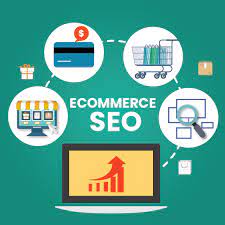
SEO for Ecommerce Course: Boost Your Online Store’s Visibility
In today’s competitive online marketplace, having a well-optimised ecommerce website is crucial for attracting customers and driving sales. Search Engine Optimization (SEO) plays a vital role in ensuring that your online store ranks high in search engine results, making it easier for potential customers to find your products and services.
What is SEO for Ecommerce?
SEO for ecommerce involves implementing strategies and techniques to improve your website’s visibility on search engines like Google, Bing, and Yahoo. By targeting relevant keywords, creating high-quality content, optimizing product descriptions, and building quality backlinks, you can enhance your online store’s chances of appearing on the first page of search results.
Benefits of SEO for Ecommerce
Investing in an SEO for ecommerce course can offer numerous benefits to your online store:
- Increased Traffic: By improving your website’s visibility in search results, you can attract more organic traffic from potential customers looking for products similar to yours.
- Better Conversion Rates: Optimising your ecommerce site can lead to higher conversion rates as visitors are more likely to make a purchase when they find what they’re looking for quickly and easily.
- Enhanced Brand Awareness: Ranking higher in search results can help build brand awareness and credibility among online shoppers.
- Cost-Effective Marketing: SEO is a cost-effective marketing strategy compared to traditional advertising methods like paid ads or sponsored posts.
Enrol in an SEO for Ecommerce Course Today!
If you’re ready to take your online store to the next level and boost its visibility on search engines, consider enrolling in an SEO for ecommerce course. Learn how to implement best practices, stay updated on the latest trends, and drive more traffic and sales to your ecommerce website. Invest in SEO today and watch your online business thrive!
Top 5 SEO Tips for Enhancing Your Ecommerce Course
- Optimize product descriptions with relevant keywords
- Create unique and compelling meta titles and descriptions for each product page
- Improve website loading speed for better user experience and SEO ranking
- Utilize internal linking to improve site navigation and SEO performance
- Optimise images by using descriptive filenames and alt text
Optimize product descriptions with relevant keywords
To enhance the visibility of your online store and attract potential customers, it is essential to optimise product descriptions with relevant keywords. By incorporating keywords that are commonly used by your target audience when searching for products online, you can improve the chances of your products appearing in search engine results. Crafting descriptive and keyword-rich product descriptions not only helps with SEO but also provides valuable information to shoppers, increasing the likelihood of conversions and sales on your ecommerce platform.
Create unique and compelling meta titles and descriptions for each product page
Creating unique and compelling meta titles and descriptions for each product page is a crucial tip in SEO for ecommerce courses. By crafting individualised titles and descriptions that accurately reflect the content of the page while also enticing users to click through, you can improve your online store’s visibility in search engine results. These meta tags serve as a preview of what customers can expect on the product page, making them more likely to click and explore further. Implementing this strategy not only enhances your SEO efforts but also enhances the overall user experience, leading to increased traffic and potential conversions for your ecommerce website.
Improve website loading speed for better user experience and SEO ranking
Improving your website loading speed is a crucial tip for enhancing user experience and boosting your SEO ranking. A fast-loading website not only keeps visitors engaged and satisfied but also signals search engines that your site is reliable and user-friendly. By optimising images, reducing server response time, and leveraging browser caching, you can create a seamless browsing experience that not only pleases users but also improves your chances of ranking higher in search results. Prioritising website speed as part of your SEO for ecommerce course can lead to increased traffic, higher conversion rates, and ultimately, a more successful online store.
Utilize internal linking to improve site navigation and SEO performance
Internal linking is a powerful strategy to enhance site navigation and boost SEO performance for ecommerce websites. By strategically linking relevant pages within your site, you not only make it easier for visitors to explore different sections but also help search engines understand the structure and hierarchy of your website. This can lead to improved indexing, better crawlability, and ultimately higher visibility in search engine results pages. Incorporating internal links wisely can not only improve user experience but also contribute to a more robust SEO strategy for your online store.
Optimise images by using descriptive filenames and alt text
When enhancing your ecommerce website’s SEO, a valuable tip is to optimise images by utilising descriptive filenames and alt text. By naming images with relevant keywords and providing informative alt text, you not only improve accessibility for visually impaired users but also help search engines understand the content of your images. This practice can boost your online store’s visibility in search results and drive more organic traffic to your product pages, ultimately enhancing the overall user experience and increasing the likelihood of conversions.





